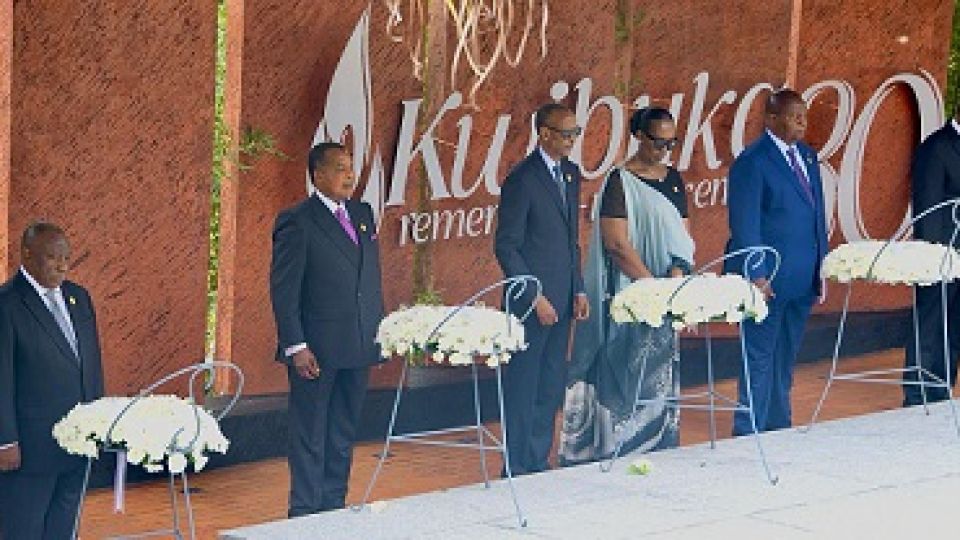from PHYLLIS BIRORI in Kigali, Rwanda
Rwanda Bureau
KIGALI, (CAJ News) – FROM suffering one of the worst atrocities in the 20th century, to being a global example of peace, unity, reconciliation and transformative governance, Rwanda’s turnaround has been miraculous.
The East African country is commemorated the 30th anniversary of the Rwanda genocide, when according to the government, up to 1 million civilians from the Tutsi minority group were massacred by militias of the majority Hutu.
An estimated 500 000 people were raped during the 100 days of the genocide that began on April 7 in 1994, following the previous day’s assassination of then president, Juvénal Habyarimana, alongside Burundi counterpart, Cyprien Ntaryamira, when their plane was shot at in Kigali.
Sunday kicked off a week-long period of mourning, with flags flying at half mast, and 100 days of commemoration.
The Kwibuka (To Remember) commemorations are aimed at awakening a greater awareness among African people and the international community about the value of life and humanity.
Highlighting the significance of the event, African leaders have descended on Rwanda in recent days to show solidarity and express support.
Some leaders from overseas, most prominently the Czech Republic President, Petr Pavel, attended.
“The Czech Republic played a prominent role in calling for action to stop the genocide,” said host president, Paul Kagame, a Tutsi himself.
“This spirit of solidarity and of speaking up against injustice creates lasting bonds of friendship and respect,” he added during a meeting with Pavel in Kigali.
Kagame and First Lady, Jeannette, on Sunday laid wreaths and lit the Flame of Remembrance in honour of the lives lost during the genocide.
Bill Clinton, who was president of the United States at the time of the genocide, was also in Rwanda.
Audrey Azoulay, the Director-General of the United Nations Educational, Scientific and Cultural Organisation (UNESCO) unveiled the World Heritage List plaques at four genocide memorial sites, namely Bisesero, Gisozi, Murambi and Nyamata.
Andrew Mitchell, United Kingdom Minister of State for Development and Africa, delivered a message of solidarity from King Charles III.
US Secretary of State, Antony Blinken, sent a message of solidarity.
Kagame, aged 36 at the time of the genocide, relived losing a female cousin during the massacres. He delivered a moving speech befitting the occasion for Rwanda and the continent.
“Only we as Rwandans and Africans can give full value to our lives. After all, we cannot ask others to value African lives more highly than we ourselves do,” he said.
The commemorations have prompted the African Union (AU) to appoint its first Special Envoy for Prevention of the Crime of Genocide and Other Mass Atrocities.
Moussa Faki Mahamat, the AU Commission chairperson, announced Senegalese diplomat, Adama Dieng, as the envoy.
“As AU special envoy, Mr Dieng will drive the AU agenda to combat the ideology of hate and genocide on the continent,” Mahamat said.
Dieng is the former UN under Secretary-General and Special Adviser on the Prevention of Genocide.
Today, while the country of 14 million people bears the scars of the genocide, Rwanda is lauded globally for its turnaround from a pariah state to a model of economic prosperity and unity.
“The foundation of everything is unity,” Kagame, president since 2000, said on his country’s change of fortunes.
Kagame was previously a commander of the Rwandan Patriotic Front (RPF), formerly a rebel armed force, and was instrumental in ending the genocide.
In addition to the prevailing peace and economic development, Rwanda is also among the top contributors of UN peacekeeping personnel, contributing to global and regional peace-building efforts.
“We are not just a country that has experienced the worst,” said analyst, Fiona Rutagengwa.
“We have also developed strong communities, world-class schools, entrepreneurship hubs, hydropower plants and more.”
The economy is projected to grow by 7 percent in 2024.
Challenges nonetheless linger, mostly a fallout with neighbouring Democratic Republic of Congo (DRC), over Rwanda’s alleged backing of some rebels wreaking havoc in the Congo.
– CAJ News

